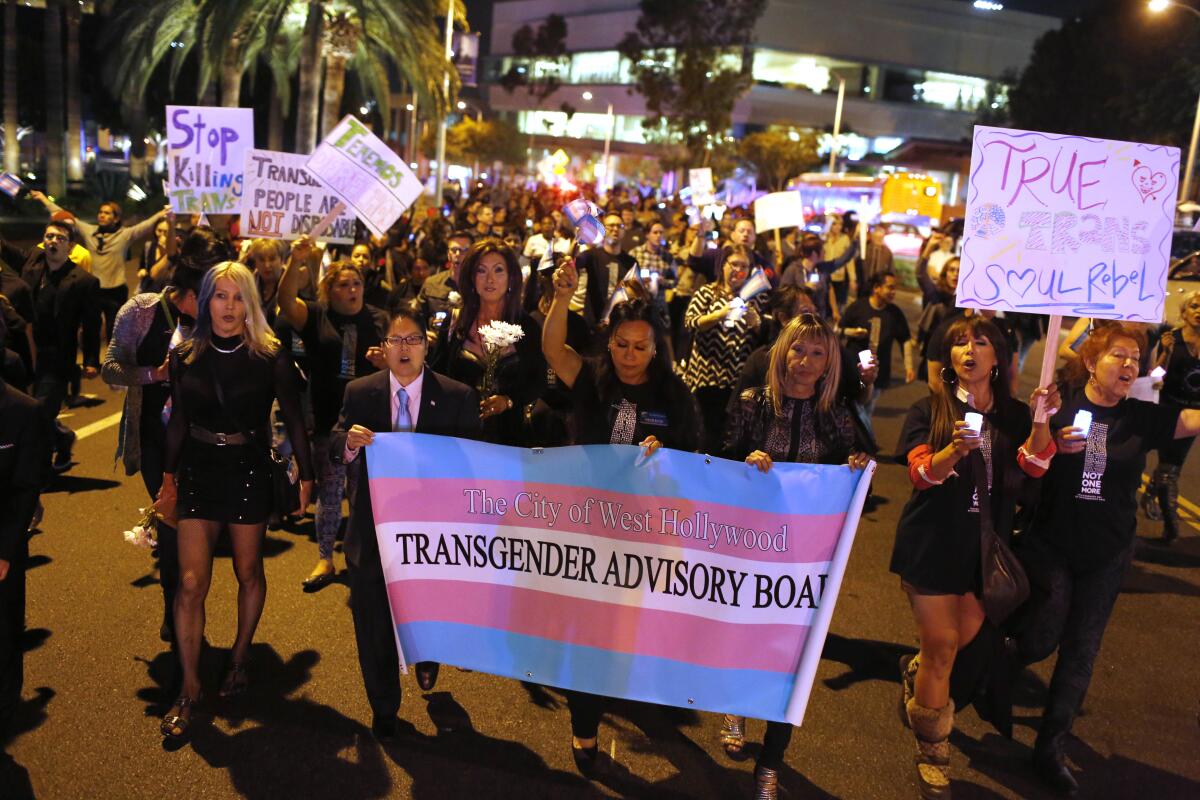Apodaca: A long way to go to achieve full acceptance and understanding

Once again we bear witness to horrific acts of violence and once again we engage in soul-searching discussions about the hate that too often leads to unspeakable crimes.
The recent shootings in Atlanta — where eight people, including six women of Asian descent, were murdered — have raised some awareness regarding the racism and injustice that Asian Americans have long experienced.
Yet, just as we are overdue for a comprehensive reckoning regarding racial intolerance, we also must not overlook another subset of our population that continues to be treated with contempt, misunderstanding, misplaced fear and violence.
I refer to the transgender community.
This is a community that remains so stigmatized that just by writing these words — a simple plea for tolerance and empathy — I fully expect to receive some vitriolic responses.
But when I read a story that appeared recently in the Daily Pilot, I knew I could not be silent.
As reported in the article, a Costa Mesa man was being held on charges of assault with a deadly weapon after allegedly beating a trans woman with a skateboard. Prosecutors referred to the incident as a hate crime.
This disturbing episode occurred against a backdrop of violence against transgender people nationwide. In 2020, the civil rights organization Human Rights Campaign Foundation reported, at least 37 transgender and gender non-conforming people were violently killed, more than in any other year since it began tracking this data in 2013.
In the 2015 U.S. Transgender Survey, the largest survey of transgender people in the United States, conducted by the National Center for Transgender Equality, 46% of respondents reported being verbally harassed and 9% were physically attacked in the previous year because of being transgender.
The columnist’s son and his bride got married last June in the midst of the pandemic, but immigration rules have complicated matters.
Trans people also encounter distressing levels of discrimination and mistreatment in workplaces, when seeking housing and healthcare, in the legal system, and within their communities and even their own families. They experience disproportionately high rates of poverty.
The pandemic may have increased the isolation and exclusion felt by transgender people; concerns have been voiced in particular regarding transgender college students who have been forced to return home to shelter with hostile family members. Since March, 2020, the Trans Lifeline crisis hotline recorded an 18 percent increase in callers reporting that they’d been rejected by their families.
Such rejection can be emotionally devastating and lead to tragic consequences. Indeed, studies have found that transgender people attempt suicide at rates far higher than in the general population.
There’s no good reason for it to be this way, yet destructive myths about this demographic remain stubbornly common.
Transgender people are often wrongly characterized as deviants and predators who pose a danger to “normal” folks. Fabricated scenarios regarding children being threatened in restrooms have fed this damaging view, when in reality it is transgender people who are routinely victimized.
Another misconception about trans people is that they are merely confused, going through “a phase” or are in need of a forceful course-correction.
“I don’t think there was ever a time I didn’t know I was a girl,” said Miliana Singh, the LGBTQ healthcare and transgender services coordinator at the LGBTQ Center OC.
Singh, who previously lived in New York and Florida, said she was raised in a transphobic community and among some family members who believe in honor killings. Though never physically assaulted, she was threatened and verbally abused.
“It was my family that had to convince me I was not a girl,” she said. “They come from a culture that has a clear-cut, linear idea of gender. I disrupted that norm.”
Prosecutors say Johnny Santos Moreno, 23, on Thursday struck a person repeatedly with his skateboard and threatened a witness who’d seen the incident and called the police.
Trans people often find they have limited legal recourse. There is no comprehensive federal nondiscrimination law that includes gender identity, and many states have introduced legislation that would restrict transgender rights.
Nonetheless, there are signs that attitudes are evolving, possibly due in part to more frequent and sensitive media portrayals of trans people.
According to HRC, support for transgender rights among Americans more than doubled in just a few years, to 62 percent by 2019.
There have also been some significant legal victories, most notably the U.S. Supreme Court’s ruling last June that the 1964 Civil Rights Act protects gay, lesbian and transgender employees from discrimination based on sex.
And in December, the high court voted to preserve an Oregon public school district’s policy of accommodating transgender students’ use of bathrooms and locker rooms that corresponded to their gender identity.
In another sign of progress, the House of Representatives last month passed an amendment that would create the first grant program to support LGBTQ survivors of domestic violence, sexual assault and stalking.
Also in March, Dr. Rachel Levine became the first openly transgender federal official in U.S. history with her confirmation as assistant secretary of the Department of Health and Human Services.
Change is occurring at the local level as well. The Irvine Police Department, for example, has two officers assigned as liaisons to the LGBTQ community.
While these are all positive steps, trans people still have a long way to go to achieve full acceptance and understanding.
At the bare minimum, they should not have to live in fear that they will be harmed simply for living their lives in ways that feel authentic to them. On that point, at least, I hope we can all agree.
All the latest on Orange County from Orange County.
Get our free TimesOC newsletter.
You may occasionally receive promotional content from the Daily Pilot.




